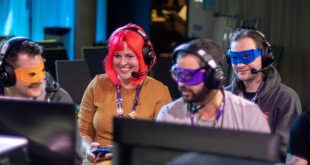Every month an industry leader wraps up MCV with their unique insight. In June, our Final Boss was CEO of Women in Games, Marie-Claire Isaaman. She talks on the organisation, its achievements to date and how there’s a will in the industry to do better.
How did you start working with the games industry?
By chance! Different strands of creative interests and educational expertise collided. In the 1990s, I was working as an artist/educator and bringing up my son as a single mother. We spent a lot of time together and his enjoyment of games engaged me with them so I taught myself the history of video games and the development processes of making them.
What’s been the most ludicrous single moment of your career to date?
In a serious business meeting with a senior male figure, having the conversation suddenly stopped and being told I had interesting eyebrows… What do you say to that!
You have directed BA and MA programmes, and continue to be an academic consultant on educational and research project – what’s it like to see the next generation of artists and designers passing through?
It is quite wonderful to see the progression of the next generation and to know somewhere you are a part of that. I recently met up with Rosie Ball, Chucklefish’s brand designer, at GDC. I have always introduced her as one of my graduates, but now I introduce her as my friend – a friend who now teaches me new things!
“In a serious business meeting, the conversation suddenly stopped and he told me I had interesting eyebrows… What do you say to that!”
What are the biggest hurdles still facing the games industry and academia relationship?
I think there is definitely a will to get over the hurdles but it’s complicated. And having straddled the fence, what I see are very different types of organisations with distinct hierarchies, different challenges, and some different processes and purposes. Like in any meaningful relationship, making time and space for frank and purposeful discussion would go a long way towards overcoming misunderstandings and forging a fruitful future.
How has Women In Games evolved over the years?
Back in 2009 when Women in Games was founded, a US Gallup poll had already indicated that approximately half of all players were women. But the Creative Skillset UK Games Workforce Survey of the same year revealed that only four per cent of the UK games industry was female. So, a decade ago, women were enthusiastically playing games, but very few were making them. It is from this imbalance that Women in Games emerges. Founded by David Smith as ‘Women in Games Jobs’, it was a platform where women could connect with each other, share job opportunities, offer support and discuss issues.
Since them, what has been achieved? What has proven more difficult than you ever expected?
This year, Women in Games is celebrating its tenth anniversary. We still host and support community platforms, with a professional network of 12,000 women and interested allies connected across social media. We host two major public events each year: our Women in Games Lunch at Develop:Brighton each July and the European Women in Games Conference & Awards in September. In the service of gender equality, we work with multiple partners across industry and educational sector. While we have recently garnered organisational support from some progressive studios we need more engagement to develop our action-based programmes.
Who continues to impress you in the industry?
Women who support each other in the sector through action – such as Liz Prince from Amiqus, with the G into Gaming campaign. There is an emergent group of sassy young women getting their creative and professional voices heard, forging creative pathways, setting up studios, diversity groups, networks, encouraging the younger generation… Their passion and resilience is really impressing me: Pixels & Prosecco, Limit Break Mentorship, PoC, GirlsMakeGames…

 MCV/DEVELOP News, events, research and jobs from the games industry
MCV/DEVELOP News, events, research and jobs from the games industry




